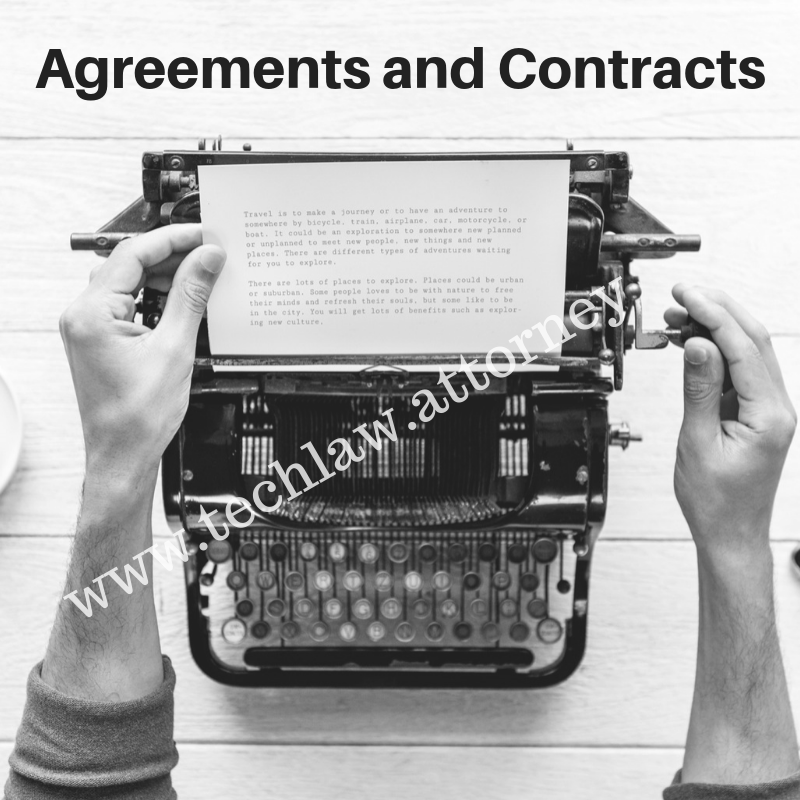
Agreements and Contracts
Drafting of Contracts and Agreements form an important part of legal practice. In India, agreements and contracts are governed as per the provisions of the IndianContract Act of 1872.

Generally, it can be stated that all contracts are agreements but not all agreements are contracts because all agreements are not legally binding. Essentially, it is always advised to have a written contract because a written contract has an evidentiary value, and it implies legal and business requirements explicitly.
Broadly, agreements can be classified into three categories, including, (a) Agreements to Agree, (Exclusive Agreements / Non-compete Agreements / Non-disclosureAgreements) (b) Transactional Agreements / Collaborative Agreements (ConditionsPrecedent), and, (c) Continuous Agreements (Dispute resolution / Terms andConditions / Performance Standards)
For the purposes of drafting of agreements or drafting of contracts, it becomes critical for the drafting attorney to execute preliminary documents for laying the foundation of a legally binding contract. Such preliminary documents can include a memorandum of understanding (MoU) or a letter of intent (LoI), or a Termsheet. Additional steps to be executed by contract drafting attorney include DueDiligence, setting of Pricing and Terms, along with deciding the constituents of an agreement.
A legally valid agreement or a contract shall contain certain essential elements, including a preamble or a background, an operative clause, along with various boilerplate clauses.
Generally, body of a contract includes a Cover page stating the Title and Name of theAgreement, followed by subsequent content or intent. This is followed by the preamble including the name of the agreement with date and place of execution. Subsequently, description of the parties is included stating full official names without any abbreviations. Thereafter, role of each party is defined stating the identity of parties, brief about the understanding between the parties, purpose of the agreement, and definition of terms, which are generally stated in the chronological order.
Another best practice for drafting contracts include stating proper definition of abbreviations, so as to clarify what each term means, along with proper mention of transaction. It is further advisable to include the subject matter of the agreement in the operative clause along with the effective date of the agreement.
Conditions precedent section of an agreement includes conditions that are required to be fulfilled, and hence in case of delay, possible timelines can be defined to state that such conditions can be fulfilled within two or three months of execution of the agreement. Such conditions can include, for example, board’s approval, shareholder’s approval, banker’s approval, government requirements, and the like. In addition, important provisions of an agreement include defining modalities at closing, fixing time & responsibilities, post-closing/conditions subsequent, lock-in, minimum committed period for engagement, compensation if any party walks out prior to the termination, confidentiality clause, inclusions, exclusions, time Frame, Remedies for breach, governing law, jurisdiction, dispute resolution (arbitration or mediation), and the like.
Advocate Rahul Dev is a Patent Attorney & International Business Lawyer practicing Technology, Intellectual Property & Corporate Laws. He is reachable at rd (at) patentbusinesslawyer (dot) com & @rdpatentlawyer on Twitter
Quoted in and contributed to 50+ national & international publications(Bloomberg, FirstPost, SwissInfo, Outlook Money, Yahoo News, Times of India, Economic Times, Business Standard, Quartz, Global Legal Post, International Bar Association, LawAsia, BioSpectrum Asia, Digital News Asia, e27, Leaders Speak, Entrepreneur India, VCCircle, AutoTech)
Regularly invited to speak at international & national platforms (conferences, TV channels, seminars, corporate trainings, government workshops) on technology, patents, business strategy, legal developments, leadership & management
Working closely with patent attorneys along with international law firms with significant experience with lawyers in Asia Pacific providing services to clients in US and Europe. Flagship services include international patent and trademark filings, patent services in India and global patent consulting services.
Global Blockchain Lawyers (www.GlobalBlockchainLawyers.com) is a digital platform to discuss legal issues, latest technology and legal developments, and applicable laws in the dynamic field of Digital Currency, Blockchain, Bitcoin, Cryptocurrency and raising capital through the sale of tokens or coins (ICO or Initial Coin Offerings).
Blockchain ecosystem in India is evolving at a rapid pace and a proactive legal approach is required by blockchain lawyers in India to understand the complex nature of applicable laws and regulations.